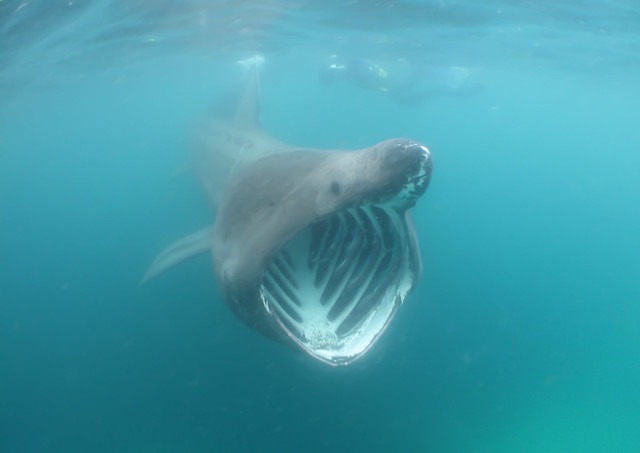Basking sharks are the second-largest fish species in the world and are often spotted in the waters off Cornwall. They are known for their immense size and gentle nature, these sharks have captured the attention of marine enthusiasts and scientists alike. Recently, Cornwall Harbour has seen an increase in basking shark sightings, drawing interest from both locals and tourists.
Understanding Basking Sharks
Basking sharks (Cetorhinus maximus) are large filter-feeding sharks that can grow up to 10 metres long. They are often mistaken for great whites due to their size but are harmless to humans. Basking sharks feed primarily on plankton, using their enormous mouths to filter vast quantities of water.
These sharks are migratory and often travel thousands of miles to find suitable feeding grounds. In the UK, basking sharks are most commonly spotted between April and October, particularly in the southwest, including Cornwall. Their presence in these waters is a positive sign, indicating healthy marine ecosystems and plentiful food sources.
Recent Sightings in Cornwall
The latest news from Cornwall Harbour highlights an uptick in basking shark sightings this season. Local boat operators and wildlife enthusiasts have reported numerous encounters with these gentle giants, often spotting them while out on the water. The increase in sightings has sparked excitement among marine biologists and conservationists, who see it as a chance to learn more about basking sharks’ behaviours and migration patterns.
Tourism businesses in Cornwall are also benefiting from the rise in basking shark sightings. Many boat tours now offer dedicated basking shark watching experiences, allowing visitors to see these incredible creatures up close. Operators ensure that these tours follow responsible wildlife viewing guidelines, minimising disturbances to the sharks and their habitats.
Conservation Efforts
Basking sharks are classified as vulnerable on the International Union for Conservation of Nature (IUCN) Red List due to threats such as fishing, habitat loss, and climate change. In recent years, various conservation efforts have been initiated to protect these magnificent creatures. The Cornwall Wildlife Trust plays a crucial role in these efforts, conducting research and awareness campaigns to educate the public about the importance of safeguarding basking sharks.
In collaboration with marine organisations, the Trust works to monitor basking shark populations and their habitats. By collecting data on sightings and behaviours, researchers can better understand their migration patterns and feeding habits. This information is vital for developing effective conservation strategies.
Engaging the Community
Local communities in Cornwall are becoming increasingly engaged in basking shark conservation efforts. Educational workshops and outreach programmes aim to raise awareness about the significance of these gentle giants. Schools and community groups participate in initiatives that encourage responsible boating practices and the protection of marine environments.
The involvement of local residents and businesses is essential for the success of these conservation efforts. By fostering a sense of stewardship towards the marine environment, Cornwall can ensure that basking sharks continue to thrive in its waters for generations to come.
The Impact of Climate Change
Climate change poses a significant threat to basking sharks and marine ecosystems as a whole. Rising ocean temperatures can affect the distribution of plankton, which directly impacts the food supply for these sharks. Additionally, changes in ocean currents can alter migratory patterns, making it more challenging for basking sharks to find suitable feeding grounds.
Scientists are actively researching the effects of climate change on basking sharks, aiming to understand how these changes impact their populations. By studying the interactions between climate, food availability, and basking shark behaviour, researchers hope to identify strategies to mitigate these challenges.
What to Expect in the Coming Months
As summer approaches, Cornwall Harbour is expected to see more basking sharks in its waters. Tourists and locals alike can look forward to increased opportunities for sightings. Boat tours will continue to run throughout the season, providing safe and responsible ways to view these incredible creatures.
Marine biologists will also continue their research efforts, gathering data to contribute to the conservation of basking sharks. Community engagement initiatives will expand, ensuring that locals remain informed and involved in protecting these gentle giants.


